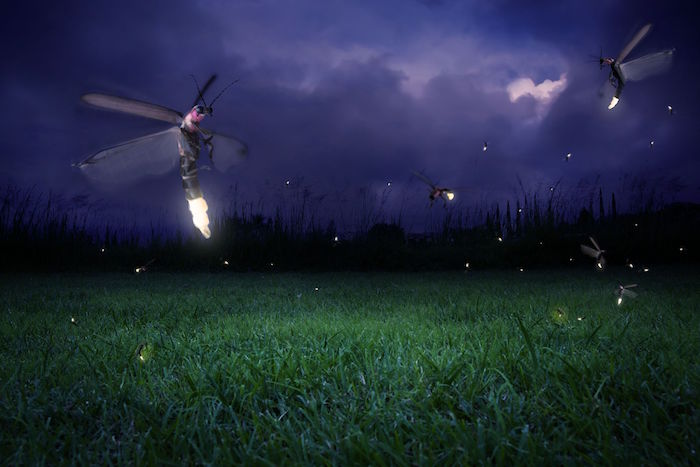View from the Garden: Fireflies: Bringing Nature Back into Your Yard

When I was a girl, summer evenings provided relief from the sweltering Nebraska days. We took out the lawn chairs and watched the lightning bugs, also known as fireflies. We weren’t allowed to catch them, though. My mother didn’t understand why anyone would want to catch a bug!
I rarely see fireflies now. I hope that you do, but their numbers are declining everywhere. Scientists are just beginning to research this, though they’ve already put forth some suppositions, the big one being human encroachment on the insects’ habitat.
Fireflies need the things in their environment that we like to “keep under control”: Some standing water, like small ponds—but that might attract mosquitoes, and we need to spray for mosquitoes. Fireflies also prefer leaf litter, rotten logs and tall grass on the lawn, but most people find any of those elements unsightly or are worried there might be ticks—and, of course, we need to spray for ticks. We use pesticides on the lawn to prevent weeds, but those chemicals also prevent bugs. Meadows and moist fields are ideal for fireflies, but there aren’t many of them left. And, of course, we need to light our streets and houses, landscapes and gardens. There’s no darkness for a flashing firefly to attract a mate.
No wonder fireflies are declining. So are bees and other beneficial insects. We’re dependent on a healthy ecosystem and the decline of these insects is a clear indication of an ecosystem in trouble. I feel strongly that we need to begin to make some changes, and if we make them incrementally, they’ll be less painful.
– If you must spray for ticks, insist that the spray be organic and applied only early in the morning, when insects are less active. Realize that spraying won’t kill all ticks.
– Usually people like to keep their lawns short, but short grass isn’t good for fireflies. Consider contacting a lawn care professional who keeps lawns using organic techniques.
– Use Damminix Tick Tubes to help with tick control. These biodegradable tubes contain cotton balls infused with a chemical that kills ticks. Mice use the cotton balls for their nests, where tick larvae like to winter. The first meal of the tick larvae will be from the blood of mice exposed to the chemical (the mice aren’t affected), and will kill the ticks. If you live next to a wooded area, edge it with a three-foot border of wood chips. The best prevention, though, is to examine yourself, your family members and pets for ticks after you, or they, have been outside. Realize you can’t eliminate all ticks from your environment, but you can lessen the risk of contracting a tick-born illness.
– Use no pesticides anywhere unless absolutely necessary. You might need to find people to help you make this change, as the alternative to chemicals are many and involved.
– The wildlife in our landscapes all need water. Consider a small pond. Keep the surface moving with a small pump. Add a couple of goldfish or koi, and they’ll take care of any mosquito larvae.
– Turn off the lights on your property when they’re not needed. This not only helps insects, but the more of us that do it, the more stars we’ll all see. I read that most people in the U.S. can’t see the Milky Way. When I was a girl, the Milky Way was right there.
I suspect that many of us are not aware of the results of these changes I’ve suggested. We try so hard to live in what we think of as a perfect environment. But a perfect environment has bees, worms, clover in the lawn, dragonflies hovering over a pond, birds nesting in the trees and finding food close by for their young, healthy soil growing nutritious food, plants that don’t need fertilizer every year and many fireflies to dazzle the evening sky.
Jeanelle Myers is a professional gardener, landscaper and consultant. For gardening discussion you can call her at 631-434-5067. For more information visit jeanellemyersfinegardening.com.



